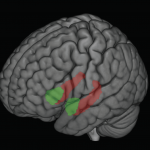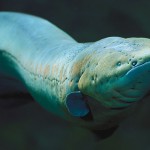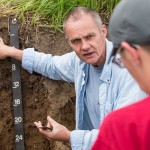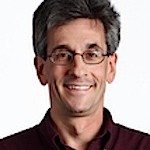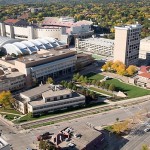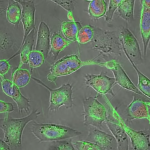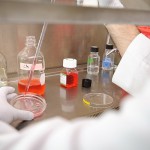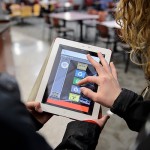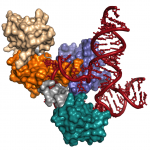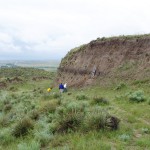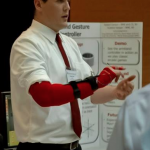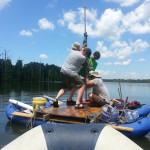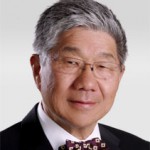Tag Research
UW, Madison schools team up to train mindfulness muscles
Mindfulness practice in the classroom may be one way to help students improve their academic performance, nurture their emotional well-being and bolster their behavior.
Early life stress can leave lasting impacts on the brain
For children, stress can go a long way. A little bit provides a platform for learning, adapting and coping. But a lot of it - chronic, toxic stress like poverty, neglect and physical abuse - can have lasting negative impacts.
Scientists find the shocking truth about electric fish
Scientists have found how the electric fish evolved its jolt.
UW-Madison becomes newest Intel Parallel Computing Center
The University of Wisconsin–Madison has been selected to join the Intel Parallel Computing Centers program.
Faster, safer method zaps tumors with great success
When Kevin McSweeney was referred to UW Health last year for a tumor in his liver, he had already gone through six rounds of chemotherapy and 13 surgeries over ten years to treat his metastasized cancer.
Chemical strategy hints at better drugs for osteoporosis, diabetes
By swapping replacement parts into the backbone of a synthetic hormone, UW–Madison graduate student Ross Cheloha and his mentor Sam Gellman, along with collaborators at Harvard Medical School, have built a version of a parathyroid hormone that resists degradation in laboratory mice. As a result, the altered hormone can stay around longer - and at much higher concentration, says Gellman, professor of chemistry at the UW.
New tumor-targeting agent images and treats variety of cancers
Scientists at the University of Wisconsin Carbone Cancer Center (UWCCC) report that a new class of tumor-targeting agents can seek out and find dozens of solid tumors, even illuminating brain cancer stem cells that resist current treatments.
Genes found in nature yield 1918-like virus with pandemic potential
An international team of researchers has shown that circulating avian influenza viruses contain all the genetic ingredients necessary to underpin the emergence of a virus similar to the deadly 1918 influenza virus.
UW–Madison chemist wins young teacher-scholar award
Jordan Schmidt, assistant professor of chemistry at the University of Wisconsin–Madison, is one of 15 young researchers to win prestigious 2014 Camille Dreyfus Teacher-Scholar awards.
Mobile sustainability game spurs students to take environmental action
Traversing the University of Wisconsin–Madison campus while consulting iPads and smartphones, the students in Cathy Middlecamp’s introductory environmental studies course could have been mistaken for anyone checking social media en route to class. But for these students, class was already in session. Middlecamp, a professor in the Nelson Institute for Environmental Studies, partnered with the UW Mobile Learning Incubator to have students in Environmental Studies 126 playtest a new mobile game under development that explores sustainability features on the UW–Madison campus.
Scientists capture most detailed images yet of tiny cellular machines
A grandfather clock is, on its surface, a simple yet elegant machine. Tall and stately, its job is to steadily tick away the time. But a look inside reveals a much more intricate dance of parts, from precisely-fitted gears to cable-embraced pulleys and bobbing levers.
UW-Madison links with New York museum to collect games and learning data
Leaning over a multitouch table, middle schoolers examine a digital underwater environment, shifting blocks across the screen and building lures to capture computerized fish. While the game introduces engineering principles and logic through an entertaining vehicle, the surface of the table is only half the story.
Beginning of time to unfold at UW–Madison Space Place
Eavesdrop on the beginning of time this Friday evening (May 30, 2014) at the University of Wisconsin–Madison's Space Place, 2300 S. Park St.
Buried fossil soils found to be awash in carbon
Soils that formed on the Earth’s surface thousands of years ago and that are now deeply buried features of vanished landscapes have been found to be rich in carbon, adding a new dimension to our planet’s carbon cycle.
Tinkering fosters business success for Internet of Things Lab
At first, the students considered creating an app or a smart device. But when they got down to it, they decided simplicity really is bliss.
WARF appoints Tong to board presidency
Business leader Peter Tong has been appointed the new president of the Wisconsin Alumni Research Foundation (WARF) board of trustees. Tong, who was appointed May 9, succeeds John W. Rowe, who will remain a member of the board.

